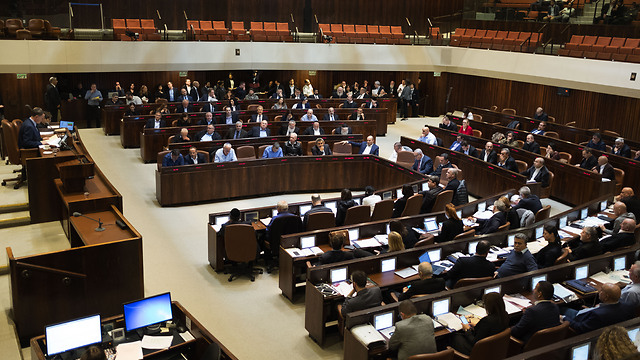
Israel never stops to think
Opinion: One of the most pervasive problems Israel faces is that when it comes to the mechanisms of the state, from unbridled bureaucracy or ending the conflict with the Palestinians, no one ever learns from the past or plans for the future.
There are those who have accused Benny Gantz of not saying anything of value before his speech on Tuesday night, yet the same is true of the other parties, who also say next to nothing. But once every four years, we expect those seeking to win over the voters to really examine the issues in depth, set aside their existing beliefs and shine on a light on matters of national importance that are not being dealt with. Sadly, however, this does not happen.
Take, for example, the state budget. The budget is determined each year by three criteria: a variety of macroeconomic data; political deals and/or new laws; and the "automatic pilot" assumption that if a certain project received funding last year, then it will receive funding the following year too, and perhaps even a higher amount. No one ever thinks to review these allocations, to look into the possibility that the initial calculations were wrong, or that perhaps certain projects are getting unnecessary allowances from one government ministry or another. Specifically, no one ever goes through a rigorous planning process or defines the objectives of every allocation.
Another worrying aspect of the state budget is the bureaucracy surrounding it. For example, if the welfare minister wants to divert NIS 5 million from supporting disadvantaged youth to help for abused women, he must receive approval from both the Finance Ministry's Budget Division and the Knesset Finance Committee. Why? This system of bureaucracy is more in line with the Soviet Union of the 1970s, but unfortunately is in use in Israel to this day. All this system does is guarantee extreme inefficiency and infinite preoccupation with trivial details.
Let's say the system is changed, so the number of clauses in the state budget is brought down to 20, to match the number of government ministries. It would increase the autonomy of individual ministers, along with their responsibility for and commitment to meeting their objectives. Would that not be an improvement? It is possible that there are other solutions, but the existing system appears to be based on the unspoken assumption of Israeli politics that "what used to be, was right, and is what will also be."
The state budget, for example, needs a double overhaul: the introduction of national planning for the national budget, and a significant reduction of clauses in the document itself. This would make it possible to free up billions of shekels to cover the existing budget shortfall, and perhaps even mean the transfer additional funds to Israel's crumbling hospitals. Hospitals, by the way, are an excellent example of how the existing system is failing. Hospital budgeting is currently conducted using a uniquely Israeli method known in Hebrew "cost minus", in which health institutions are allocated money according to their actual expenditure, minus a little bit.
This sad state of affairs is true for multiple issues in the Israeli public discourse, the most striking example being the Israeli-Palestinian conflict and the assumption that it is only possible to either contain it or advance the two-state solution. Who decided that this was the entire spectrum of options? When was that decision made?
Israel's problem is not that it makes bad choices, but the absolute lack of discussion on almost every important issue.











